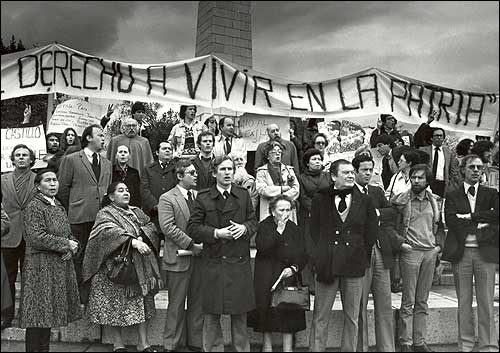Issues with Teaching the Recent Past
19 October 2014 - 8:49pm
 Through this blog I hope to spark discussions around the ways in which we teach about military regimes, violations of human rights, and the transition to democracy in the recent past - using the history of Chile as an example. Teaching the history of human rights reflects what Magendzo & Toledo focus on in their article, “Moral dilemmas in teaching recent history related to the violation of human rights in Chile.” Magendzo & Toledo examine the moral dilemmas, including tensions, conflicts and contradictions, teachers face when teaching recent Chilean history around the topic of human rights. They outline the emotions and personal narratives that characterize teachers’ pedagogy and student participation. This article describes teaching a sub-unit entitled “military regime and transition to democracy”, which continues to be an ongoing socio-political process in Chile.
Through this blog I hope to spark discussions around the ways in which we teach about military regimes, violations of human rights, and the transition to democracy in the recent past - using the history of Chile as an example. Teaching the history of human rights reflects what Magendzo & Toledo focus on in their article, “Moral dilemmas in teaching recent history related to the violation of human rights in Chile.” Magendzo & Toledo examine the moral dilemmas, including tensions, conflicts and contradictions, teachers face when teaching recent Chilean history around the topic of human rights. They outline the emotions and personal narratives that characterize teachers’ pedagogy and student participation. This article describes teaching a sub-unit entitled “military regime and transition to democracy”, which continues to be an ongoing socio-political process in Chile.
(For those of you who need a refresher: Controversy arose after the 1970 Presidential election in which Salvador Allende assumed power. In September of 1973, this government was overthrown by a coup d’etat headed by Augusto Pinochet (1973-1990), whose government violated human rights, persecuting supports of Allende and his opponents. In 1990, when Pinochet stepped down and nearly 20 years later, political polarizations continue to be a prominent issue in Chilean history and politics.)
A teacher’s task is to generate and help construct students’ interpretations of the past. Should we - historians or teachers - question whether the ‘past’ is too recent? Magendzo & Toledo assert that since Chilean society is not reconciled, the issues reproduce themselves in the classroom (463). When Chilean teachers try to deal with human rights violations and the transition to democracy from the Pinochet era in the classroom, discussions are said to be accompanied emotions and “hidden actions which are those who talk and feel and those who listen and feel” (462). How can a teacher navigate a discussion around those who talk, those who listen, those who support and do not support Pinochet?
Some people view history education as a way to teach citizenship education. This process becomes much more complicated when not enough time has elapsed since the violent past. Magendzo & Toledo shed light on the moral dilemmas teachers encounter:
1. Neutrality in teaching: When emotionally and ideologically charged discussions present themselves in the classroom it makes it difficult to teach neutrality. Thus, the “Ministry of Education does not solve the problem, but imposes a moral dilemma. The moral dilemma is placed on the teachers by the request for them to present differing interpretations” (452).
2. Implication of the students by the facts. Teaching recent history is related with the lives and experiences of students and their family members in the class.
3. The potential Victimisation of students when they learn history from family members, which are ideologically and emotionally charged.
4. Teachers political ideology, which differs from the opinions of students.
Chilean teachers do not always have the competencies or pedagogical requirements to teach recent and violent history, even less so for solving tensions or conflicts (462). How can teachers resolve tensions that emerge from teaching the recent past, when both teachers and students are emotionally, politically and ideologically charged and affected?
After completing this blog, I must ask: Should we - historians or teachers - question whether the ‘past’ is too recent? There are scholars who have written about teaching these difficult and violent histories and I would like to recommend some additional sources.
Works Cited:
Magendzo, Abraham and Toledo, María Isabel (2009). “Moral dilemmas in teaching recent history related to the violation of human rights in Chile.” Journal of Moral Education (December), 38 (4), 445-465.
Additional Sources:
Cole, Elisabeth (Editor, 2007). Teaching the Violent Past: History Education and Reconciliation. Lanham, MD: Rowman & Littlefield Publishers. [cases: Germany, Japan, Aboriginals in Canada, Northern Ireland, Spain, Guatemala, Russia/Soviets, Korea, India & Pakistan].
Seixas, Peter, Carla Peck & Stuart Poyntz (2011). “'But we didn't live in those times’: Canadian students negotiate past and present in a time of war.” Education as Change, 15 (1), p. 47- 62.
Zadja, Joseph & Rea Zadja (2002). “Reinventing the past to create the future: the rewriting of school history textbooks in post-communist Russia.” In Michele Schweisfurth, Lynn Davies & Clive Harber (Editors), Learning Democracy and Citizenship: International Experiences. Oxford, UK: Symposium Books, p. 211-224.
Photo credit: "Protestas en Chile contra el Régimen Militar, en 1985" Wikimedia Commons

